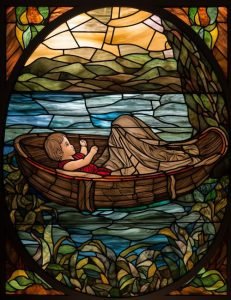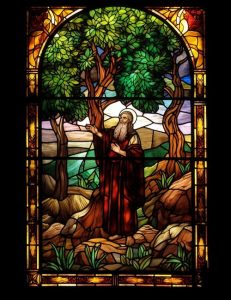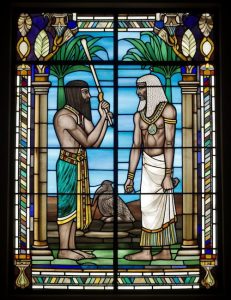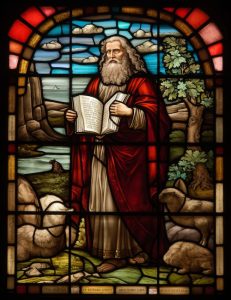Introduction to Moses – serving God with a speech impediment
You don’t have to be perfect to be a Christian! I have a disability, two sleep disorders, experience chronic pain and use a wheelchair. However, I’ve found ways of serving God in my local church, and this blog is the first in a series that shares the lives of people in the Bible who served God with disabilities, disorders, or other health issues. This blog looks at the life of Moses. Moses was serving God with a speech impediment
Early Life and Divine Protection
The Cruel Edict of Pharaoh
The life of Moses, an instrumental figure in biblical history, began under the harshest of circumstances. Born to an Israelite family when Pharaoh had ordered the death of all Hebrew boys to prevent the rise of a potential deliverer, Moses’s life was threatened from the moment of his birth.
The River Nile: A Mother’s Sacrifice and Hope
To save her newborn from Pharaoh’s cruel edict, Moses’s mother, Jochebed, placed him in a waterproofed basket and set it among the reeds of the River Nile, entrusting her son’s fate to Providence. As fate would have it, Pharaoh’s daughter discovered the baby while bathing in the river. Moved by the crying infant, she decided to adopt him, and Moses’s own sister, Miriam, who had been watching from a distance, cleverly offered Jochebed’s services as a nursemaid. Thus, Moses was raised in Pharaoh’s palace, receiving the finest Egyptian education while still remaining connected to his Hebrew roots.
The Conflict of Dual Identity
Growing up, Moses was torn between his Israelite heritage and Egyptian upbringing. This internal conflict culminated in a life-altering incident where he witnessed an Egyptian taskmaster beating a Hebrew slave. In a rage, Moses killed the Egyptian and buried him in the sand. This act led to his exile from Egypt when his crime was discovered.
A New Life in Midian and the Burning Bush
Finding Refuge and Purpose in Midian
Escaping the wrath of Pharaoh, Moses found refuge in the desert land of Midian. There, he rescued Jethro’s seven daughters from shepherds at a well, earning their gratitude and leading to his marriage with one of them, Zipporah. Over time, he became a shepherd, tending to his father-in-law’s flock, a stark contrast from his princely days in Egypt.
Encounter with the Divine
While herding sheep on Mount Horeb, Moses witnessed a phenomenon that would mark the turning point in his life: a bush that burned without being consumed. As he approached this marvel, God spoke to him from the flames. In humility, Moses hid his face, fearing to look upon God.
God’s Call and Moses’s Apprehension
The Lord revealed to Moses the plight of the Israelites in Egypt and declared him the chosen one to lead them to freedom. But Moses was filled with doubt. How could he, an exile and mere shepherd, confront Pharaoh and demand the release of the Israelites?
The Speech Impediment: A Barrier to Communication
Moses’s insecurities weren’t just about his past or capabilities but also his speech impediment. He mentioned his eloquence, or lack thereof, as a significant concern, expressing doubt that Pharaoh would listen to him. Recognizing this, God appointed Aaron, Moses’s brother, as his spokesperson.
Confrontation with Pharaoh and Display of Divine Power
Returning to Egypt: A Divine Mission
Armed with the divine mandate and Aaron by his side, Moses returned to Egypt. He and Aaron assembled the elders of the Israelites, revealing to them the promise of liberation. Bolstered by God’s words and a series of miraculous signs performed by Moses, the Israelites believed and bowed down in worship.
 Challenging the Might of Pharaoh
Challenging the Might of Pharaoh
The initial confrontations with Pharaoh were daunting. When Moses and Aaron demanded, “Let my people go,” Pharaoh refused, increasing the burden on the Israelites by denying them the straw for brick-making while demanding the same quota. This decision was a tactical move to demoralize the Israelites and discredit Moses.
The Ten Plagues: God’s Judgement on Egypt
God responded to Pharaoh’s stubbornness by sending ten devastating plagues upon Egypt. Each plague targeted a specific Egyptian god, showcasing the Lord’s supremacy. From turning the Nile into blood to the death of the firstborn, these plagues systematically dismantled Egypt’s socio-religious fabric.
The Struggle within Moses
Throughout these confrontations, Moses grappled with his own doubts and the immense weight of responsibility. He witnessed the suffering of his people and dealt with their accusations when things got worse. Yet, God reassured him every time he felt overwhelmed, strengthening his resolve.
The Exodus and Challenges in the Wilderness
The Night of Liberation
The final plague, the death of the firstborn, forced Pharaoh to relent. Following God’s instructions, the Israelites marked their doorposts with lamb’s blood, ensuring their safety from the angel of death. This event is commemorated as Passover. With Pharaoh’s reluctant blessing, they began their exodus.
 Crossing the Red Sea: A Testament to Faith
Crossing the Red Sea: A Testament to Faith
Pharaoh’s change of heart saw him pursuing the Israelites. With the Red Sea ahead and Egyptian chariots behind, the Israelites despaired. In this dire situation, Moses, bolstered by his unwavering faith, raised his staff. The waters parted, allowing the Israelites safe passage and drowning the Egyptian army when they attempted to follow.
Trials in the Wilderness
The journey through the desert tested the Israelites’ faith and patience. They faced challenges like the lack of food and water and even threatened to return to Egypt. Moses, amidst these complaints, often felt the strain of leadership. Yet, through manna from heaven, water from rocks, and the giving of the Ten Commandments on Mount Sinai, God continually guided and provided for them.
Moses’s Legacy and Enduring Faith
The Final Test: The Promised Land in Sight
As the Israelites neared Canaan, spies were sent to assess the land. Their report filled the community with fear, doubting their ability to conquer the inhabitants. Distraught by their lack of faith, Moses pleaded with God on their behalf. However, the decision was made that no faithless generation, except Caleb and Joshua, would enter the Promised Land, including Moses himself.
 Moses’s Final Acts and Passing
Moses’s Final Acts and Passing
Understanding he wouldn’t enter Canaan, Moses dutifully prepared the next generation for the task ahead. He anointed Joshua as his successor and reiterated God’s laws in what is now known as the book of Deuteronomy. On Mount Nebo, Moses was granted a vision of the Promised Land before he passed away, leaving a legacy of faith, leadership, and dedication to God’s service.
Conclusion to Moses – serving God with a speech impediment
Moses’s life is a testament to unwavering faith in adversity. Despite personal challenges, including health struggles and self-doubt, Moses achieved monumental feats in serving God, liberating the Israelites and shaping them into a covenant community. His story is an enduring reminder that even the most insurmountable challenges can be overcome with faith and God’s guidance.
My second blog in the series is about the story of Job.
Please comment on your thoughts about Moses – serving God with a speech impediment.
Click here for the Wikipedia article about Moses.
Click here for additional information about this site.



 Challenging the Might of Pharaoh
Challenging the Might of Pharaoh Crossing the Red Sea: A Testament to Faith
Crossing the Red Sea: A Testament to Faith Moses’s Final Acts and Passing
Moses’s Final Acts and Passing